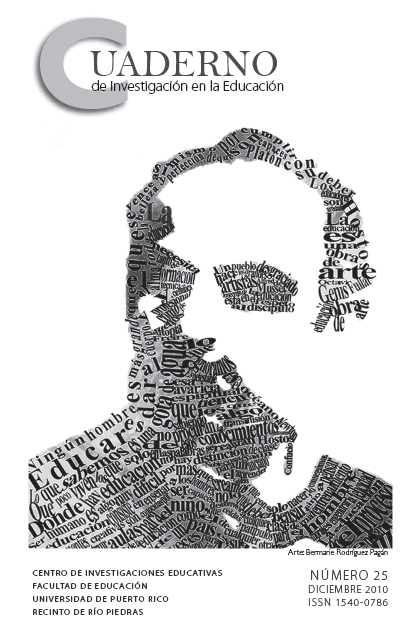Abstract
This paper wants to describe some psychosocial aspects related to academic performance in college students. It specifically examines the variables of social anxiety, self-esteem, depression, family relations and their association to academic performance. The sample —104 students (66 females and 28 males)— was selected by availability from students at the Catholic University of Puerto Rico. The research design was correlational. The results indicate that there is a significant relationship between self-esteem to levels of social anxiety and family relations, as well as a slight correlation to depression. Nevertheless, the data rule out any relationship between academic performance to the levels of social anxiety, self-esteem, depression and family relations.
Cómo citar:
Serra Taylor, J. A. (2010). Aspectos psicosociales y el rendimiento académico en estudiantes universitarios. Cuaderno de Investigación en la Educación, 25, 75-89. Retrieved from https://revistas.upr.edu/index.php/educacion/article/view/13536
References
Alvelo, J., Del Valle, L. E. (2003). La adaptación y validación al español de una batería de 27 escalas (MPSI) para medir problemas psicosociales con una muestra puertorriqueña. Análisis, 4(1), 225-247.
American College Health Association (2007). American College Health Association, National College Health Assessment Spring 2006: Reference Group Data Report. Journal of American College Health, 55, 195-206.
American Psychiatric Association. (1994). Diagnostic and Statistical Manual of Mental Disorders: DSM-IV. Washington: APA.
Arco, J. L., Fernández, F. D., Heilborn, V. A. & López, S. (2005). Demographic, academic and psychological profiles of students attending counseling services at the University of Granada, Spain. International Journal for the Advancement of Counseling, 27, 71-85.
Battle, J., Jarratt, L., Smit, S. & Precht, D. (1988). Relations among self-esteem, depression and anxiety of children. Psychological Reports, 62(3), 999-1005.
Bueno Delgado, G. (2005). Perfil sociodemográfico de los estudiantes universitarios sin progreso académico y la relación entre el apoyo psicosocial con enfoque de resiliencia y el éxito académico en los estudiantes de primer año de universidad (Tesis doctoral). Universidad Complutense de Madrid, España.
Cheung, C. & Kwok, S. (1998). Activities and academic achievement among college students. The Journal of Genetic Psychology, 159(2), 147.
Connor, K. M., Davidson, J. R. T., Churchill, L. E., Sherwood, A. & Weisler, R. H. (2000). Psychometric properties of the Social Phobia Inventory (SPIN). The British Journal of Psychiatry, 176, 379-386.
Consejo de Educación Superior de Puerto Rico (2004). La Educación Superior en Puerto Rico: Observatorio de la Educación Superior de América Latina y el Caribe. San Juan, Puerto Rico.
Heiligenstein, E., Guenther, G., & Hsu K, Herman K.J. (1996). Depression and academic impairment in college students. American College Health, 45(2), 59-64. Recuperado de: http://www.ncbi.nlm.nih.gov/pubmed/8908879
Herrero, J.; Musitu, G.; Gracia, E. (1995). Autoestima y depresión: relaciones directas versus indirectas. Revista de Psicología Social, 10(2), 191.
Jiménez Chafey, M. & Villafañe Santiago, A. (2008). Necesidades psicosociales de los estudiantes que han recibido servicios del Departamento de Consejería para Desarrollo Estudiantil (DCODE) de la Universidad de Puerto Rico, Recinto de Río Piedras. Cuaderno de Investigación en la Educación, 23, 193-209.
King, A. (1998). Family Environment Scale predictors of academic performance. Psychological Reports, 83(3), 1319-1327.
Pérez Nieto, M. A., Cano Vindel, A. (1998). Intervención en fobia social: caso clínico. Psicologia.com, 2(2). Recuperado de http://www.psiquiatria.com/articulos/ansiedad/fobia_social/tratamiento190/939/
Ross, P. (2000). Sexual abuse, depression, and eating disorders in African American women who smoke cocaine. Journal of Substance Abuse Treatment, 18(1), 79-81.
Martínez Martínez, I., Bresó Esteve, E., Llorens Gumbau, S. & Grau Gumbau, R. (2005). Bienestar psicológico en estudiantes universitarios: facilitadores y obstaculizadores del desempeño académico. Anales de Psicología, 21(1), 170-180.
Vredenburg, K.; Flett, G. L.; & Krames, L. (1993). Analogue versus clinical depression: A critical reappraisal. Psychological Bulletin, 113(2), 327-344.
Zung, W. W., MacDonald, J. & Zung, E. M. (1988). Prevalence of clinically significant depressive symptoms in black and white patients in family practice settings. The American Journal of Psychiatry, 145(7), 882-883.
The contents published in the Puerto Rico Journal of Education is freely distributed under open access practices, in accordance with the Creative Commons license, Attribution-NonCommercial 4.0 International (CC BY-NC 4.0). Through these principles, the journal and its authors allow readers to access, reproduce and share articles in full text. Users should give credit to authors in a reasonable way without suggesting they have their support. Under no circumstances, readers may make use of the contents for commercial purposes. The authors retain copyright on their works.

